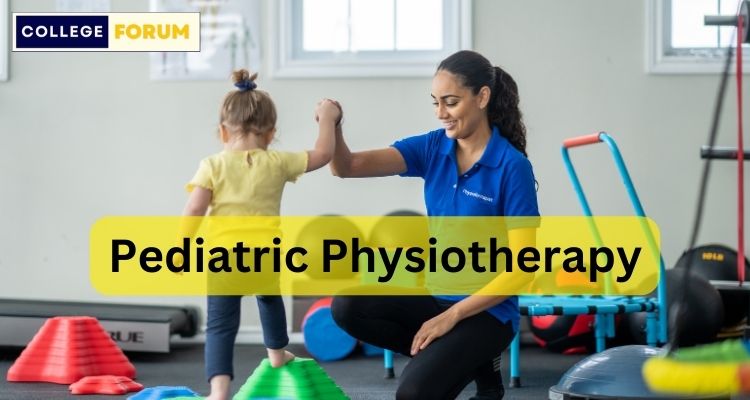Introduction of Pediatric physiotherapy in MPT Education:
Pediatric physiotherapy, a specialized branch of physiotherapy, focuses on addressing the unique needs of children with developmental disorders. From infants to adolescents, children facing developmental challenges require specialized care to optimize their physical development and improve their quality of life. In this article, we delve into the realm of pediatric physiotherapy and explore the effective interventions offered by MPT education to support children with developmental disorders.
Developmental disorders encompass a range of conditions affecting a child’s physical, cognitive, emotional, and social development. Common developmental disorders include cerebral palsy, spina bifida, muscular dystrophy, developmental delay, and congenital anomalies. These conditions can significantly impact a child’s motor skills, balance, coordination, strength, and mobility, necessitating comprehensive physiotherapy interventions.
MPT education equips physiotherapists with the specialized knowledge, skills, and techniques required to provide effective interventions for children with developmental disorders. Through coursework, clinical training, and practical experience, MPT programs prepare physiotherapists to assess, diagnose, and develop individualized treatment plans tailored to each child’s unique needs.
Effective interventions in pediatric physiotherapy encompass a variety of techniques aimed at promoting physical development, improving motor function, and enhancing overall well-being. These interventions may include:
- Early Intervention Programs: MPT education emphasizes the importance of early identification and intervention for children with developmental disorders. Physiotherapists play a crucial role in early intervention programs aimed at addressing developmental delays and promoting optimal development from infancy.
- Neurodevelopmental Therapy (NDT): NDT, also known as the Bobath approach, is a specialized technique used in pediatric physiotherapy to promote normal movement patterns and facilitate motor control in children with neurological conditions such as cerebral palsy.
- Sensory Integration Therapy: Children with developmental disorders often experience sensory processing difficulties, affecting their ability to process and respond to sensory stimuli. Sensory integration therapy, incorporated into pediatric physiotherapy interventions, aims to improve sensory processing and enhance overall functional abilities.
- Strength and Conditioning Exercises: MPT education emphasizes the importance of strength and conditioning exercises tailored to the specific needs of children with developmental disorders. Physiotherapists utilize exercises to improve muscle strength, endurance, and coordination, thereby enhancing mobility and functional independence.
- Gait Training and Mobility Aids: For children with mobility challenges, gait training and the use of mobility aids such as walkers, crutches, or orthoses are essential components of pediatric physiotherapy interventions. Physiotherapists assess gait patterns, prescribe appropriate assistive devices, and provide training to optimize mobility and independence.
- Play-Based Therapy: Play-based therapy is a cornerstone of pediatric physiotherapy interventions, engaging children in fun and motivating activities to promote physical development, motor skills, balance, and coordination. Physiotherapists incorporate play-based approaches into therapy sessions to foster engagement and maximize therapeutic outcomes.
In conclusion, pediatric physiotherapy plays a vital role in supporting children with developmental disorders to reach their full potential and achieve optimal physical function. MPT education equips physiotherapists with the specialized knowledge, skills, and interventions necessary to provide effective care for children facing developmental challenges. Through early intervention, specialized techniques, and a holistic approach to therapy, pediatric physiotherapists contribute to improving the quality of life for children with developmental disorders and their families. Additionally, pediatric physiotherapists play a crucial role in addressing the unique challenges and complexities associated with developmental disorders, such as sensory processing difficulties, behavioral issues, communication barriers, and social participation limitations. MPT education equips physiotherapists with specialized knowledge and skills in managing these challenges effectively, employing a holistic and multidisciplinary approach to care. Pediatric physiotherapy plays a vital role in supporting children with developmental disorders, promoting their physical development, functional abilities, and overall well-being. Through MPT education, physiotherapists are prepared to deliver effective interventions that address the complex needs of children with developmental disorders, empowering them to reach their full potential and thrive in all aspects of life.

